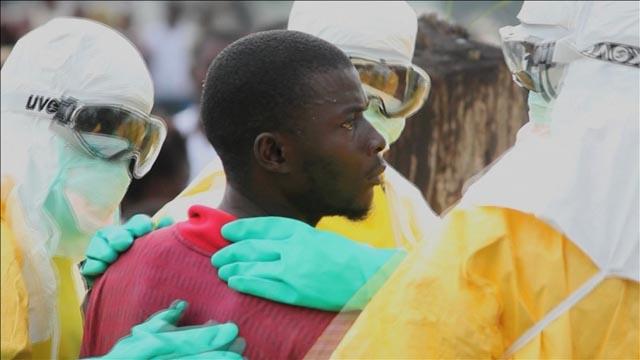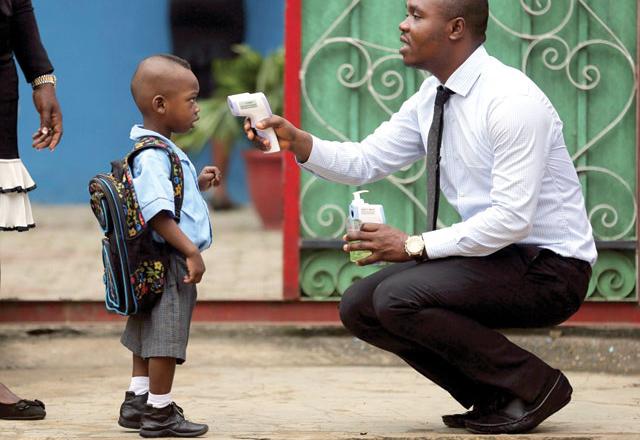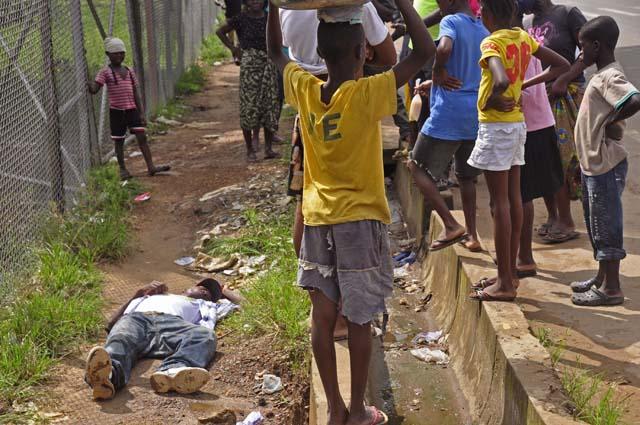You are here
World ‘losing battle’ to contain Ebola — MSF
By AFP - Sep 03,2014 - Last updated at Sep 03,2014
DAKAR — International medical agency Medecins sans Frontieres said Tuesday the world was "losing the battle" to contain Ebola as the United Nations warned of severe food shortages in the hardest-hit countries.
MSF told a UN briefing in New York that world leaders were failing to address the epidemic and called for an urgent global biological disaster response to get aid and personnel to West Africa.
"Six months into the worst Ebola epidemic in history, the world is losing the battle to contain it. Leaders are failing to come to grips with this transnational threat," said MSF international President Joanne Liu.
"The [World Health Organisation] announcement on August 8 that the epidemic constituted a 'public health emergency of international concern' has not led to decisive action, and states have essentially joined a global coalition of inaction."
Her comments came as a third American health worker tested positive for the deadly virus while working with patients in Liberia, the worst-hit country.
"My heart was deeply saddened, but my faith was not shaken, when I learned another of our missionary doctors contracted Ebola," said Bruce Johnson, president of the SIM Christian Missionary group for whom the unnamed American worked.
Two fellow US health workers who worked at the same ELWA Hospital in the Liberian capital Monrovia were previously flown home and successfully treated for the virus.
Unlike the others, the latest US victim had not been working directly with Ebola patients, and it is not yet clear how he caught the disease, which is usually fatal.
Liu called for the international community to fund more beds for a regional network of field hospitals, dispatch trained personnel and deploy mobile laboratories across Guinea, Sierra Leone and Liberia.
MSF said in a statement accompanying the briefing that the crisis was particularly acute in Monrovia, where it is estimated that "800 additional beds are needed".
"Every day we have to turn sick people away because we are too full", said Stefan Liljegren, MSF's coordinator at the ELWA Three Ebola unit in Monrovia.
MSF said that while its care centres in Liberia and Sierra Leone were overcrowded, people were continuing to die in their communities.
"In Sierra Leone, highly infectious bodies are rotting in the streets," their statement said.
The Ebola outbreak has killed 1,552 people and infected 3,062, according to the latest figures released by the WHO.
At current infection rates, the agency fears it could take six to nine months and at least $490 million (373 million euros) to bring the outbreak under control, by which time more than 20,000 people could be affected.
The UN's Food and Agriculture Organisation issued an alert that restrictions on movement in Guinea, Liberia and Sierra Leone had led to panic buying, food shortages and severe price hikes.
"With the main harvest now at risk and trade and movements of goods severely restricted, food insecurity is poised to intensify in the weeks and months to come, warned Bukar Tijani, FAO regional representative for Africa.
The food security alert was sounded as the WHO announced a separate Ebola outbreak in the Democratic Republic of Congo has now killed 31 people, although it added that the contagion was confined to an area 800 kilometres north of Kinshasa.
In Liberia, which has been hardest-hit with 694 deaths, the price of the national staple cassava on market stalls in Monrovia went up 150 per cent within the first weeks of August, the FAO said.
"This situation may have social repercussions that could lead to subsequent impact on the disease containment," said Vincent Martin, head of the FAO's Resilience Hub in Dakar, Senegal.
The UN's World Food Programme (WFP) launched an emergency operation on Tuesday to get 65,000 tonnes of food to 1.3 million people in the worst-hit areas.
The outbreak of Ebola, transmitted through contact with infected bodly fluids, has sparked alarm throughout West Africa but also further afield, with international flights being halted.
The WHO has appealed for the reversal of flight cancellations and virologists said Tuesday travel restrictions could worsen the epidemic, limiting medical and food supplies and keeping out much-needed doctors.
"If we impose an aerial quarantine on these countries, we undermine their fight against the epidemic: The rotation of foreign medical staff and distribution of supplies, already inadequate, will become even more difficult," said Sylvain Baize, head of the Pasteur Institute's viral haemorrhagic fever centre in Lyon, France.
Meanwhile, Michael Kinzer of the US-based Centres for Disease Control and Prevention likened closing borders to "closing your eyes".
"It makes more sense for countries to spend their money and energy on preparing their health systems to recognise an Ebola case and respond correctly... so that the virus does not spread," he said.
Related Articles
Scores of healthcare workers at Liberia's main hospital have gone on strike over unpaid wages, complicating the fight against the world's worst Ebola epidemic that the US disease prevention chief said was spiralling out of control.
New estimates by the World Health Organisation and the US health agency are warning that the number of Ebola cases could soar dramatically — the US says up to 1.4 million by mid-January in two nations alone — unless efforts to curb the outbreak are significantly ramped up.
Liberia battled on Tuesday to halt the spread of the Ebola disease in its crowded, run-down oceanside capital Monrovia, recording the most new deaths as fatalities from the world's worst outbreak of the deadly virus rose above 1,200.



















